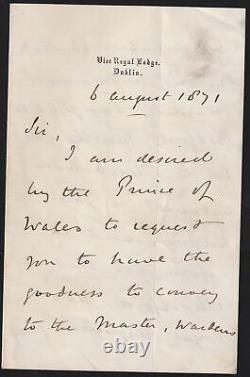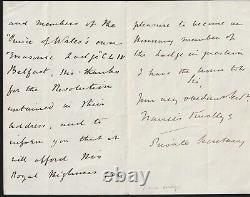
- Home
- Brand
- Avoca (18)
- Belleek (79)
- Cross (39)
- Dresden (9)
- Dresden Porcelain (6)
- Franz (8)
- Guinness (11)
- Mattel (7)
- Nicholas Mosse (5)
- Peterson (44)
- Peterson's (10)
- Petersons (6)
- Royal Tara (8)
- Tiffany & Co. (7)
- Volkstedt (8)
- Wade (8)
- Wade Ireland (5)
- Waterford (546)
- Waterford Crystal (35)
- Waterford®crystal (7)
- ... (1127)
- Design
- Material
- Bone China (22)
- Brass, Crystal (7)
- Bronze (10)
- Cardboard, Paper (11)
- Ceramic (10)
- Ceramic & Porcelain (11)
- Ceramic, Porcelain (7)
- Crystal (496)
- Crystal, Glass (29)
- Glass (40)
- Gold (13)
- Lace (8)
- Lead Crystal (12)
- Linen (20)
- Metal (12)
- Paper (10)
- Pewter (7)
- Porcelain (101)
- Wood (15)
- Wool (7)
- ... (1145)
- Pattern
- Power Source
- Size
1871 IRELAND-Vice Regal Lodge, Francis Knollys, Secretary to the PRINCE OF WALES




1871 IRELAND-Vice Regal Lodge, Francis Knollys, Secretary to the PRINCE OF WALES. This product data sheet is originally written in English. 1871 IRELAND-Vice Regal Lodge, DUBLIN Fine letter from Francis Knollys, Secretary to the PRINCE OF WALES regarding the Masters, Wardens & Members of the PRINCE OF WALES Masonic Lodge, in BELFAST, offering and him accepting becoming an honorary member of the said Lodge. Francis Knollys, 1st Viscount Knollys, GCB, GCVO, KCMG, ISO, PC (16 July 1837 - 15 August 1924) was a British courtier.
He served as Private Secretary to the Sovereign from 1901 to 1913. He entered the Royal Military College, Sandhurst, in 1851, and was commissioned into the 23rd Foot as an ensign in 1854. In the following year, however, Knollys joined the Department of the Commissioners of Audit as a junior examiner. In 1862, he became Secretary to the Treasurer to the Prince of Wales. In 1870, he was appointed Private Secretary to the Prince of Wales, an office he held until the Prince, Edward, became King in 1901.Knollys then became Private Secretary to the Sovereign, [1] an office he filled until 1913 (jointly with Arthur Bigge, 1st Baron Stamfordham from 1910[2]). He was known for his loyalty and discretion in this role. Lord Knollys died in August 1924, aged 87.
After his appointment as Private Secretary to the Sovereign, Lord Knollys was well known as the public face of the Court, and is often mentioned in memoirs and fiction of the period. In his 1911 novel C. Or in the Wireless House, Arthur Train wrote of his fixing a scandal (fictitious, this time). She was still spoken of as one of the most beautiful women in the world; but the exquisite hour of her perfection had passed.
Then, perhaps feeling that her supremacy was no longer undisputed, a sense of pique at younger and fresher women had led her into certain too flagrant indiscretions that could not be overlooked. Lord Knollys had intimated that a knighthood might please her husband; and the directorate of the Royal Bank of Edinburgh, of which he was the London manager, by a coincidence no less extraordinary than it was timely, had proposed that he should open a similar branch in New York and temporarily become its resident agent. In other words, royalty had politely indicated that, although it was deeply pained to do so, it must, for policy's sake, at least, withdraw that intimacy which it had previously been pleased to extend.
A Sandhurst man, Knollys became Secretary to the Treasurer of the Prince of Wales in 1862. His father General William Knollys had been appointed by Queen Victoria as Comptroller and Treasurer of the Prince of Wales's household with a private mandate to report on his indiscretions to the sovereign. Queen Victoria believed the Prince of Wales's affair with an Irish actress had hastened the demise of her beloved husband the Prince Consort, Albert, in 1861 and appointed Knollys Senior to make sure the errant prince sinned no more. The General reported to The Queen that her son's trips to Paris were'very unsatisfactory' and told tales of'suppers after the opera with some of the female Paris notorieties'. Francis Knollys resolved to be the prince's trusted servant and secret keeper.
By 1867, General Knollys acknowledged that he could not control the Prince of Wales. In 1870 the prince appointed Francis Knollys as his Private Secretary while keeping the services of the General for form's sake and to placate Queen Victoria. Edward VII's biographer Jane Ridley describes Francis Knollys thus:'a dapper little man with shiny black hair and a beard cut into a strip down his chin. He resembled an Italian waiter.The Queen thought he was not fit for the post demanding instead a clever, able man capable of being of use and giving advice. Her conclusion was that, though useful, Francis Knollys was not considered clever by anyone.
As Private Secretary, Francis Knollys vetted all official and personal correspondence to and from the Prince of Wales at his London townhouse Marlborough House. From 1872, his sister Charlotte was Bedchamber Woman to Princess Alexandra and thus the family were the closest confidantes of the Prince and Princess of Wales in the land. Knollys knew about the prince's vices and his failings and made it his life's work to protect the heir to the throne and shield him from scandal. Powered by SixBit's eCommerce Solution. Career In the following year, however, Knoll.Prince of Wales Masonic Lodge, Belfast.

